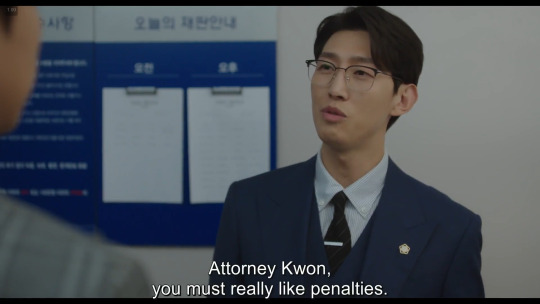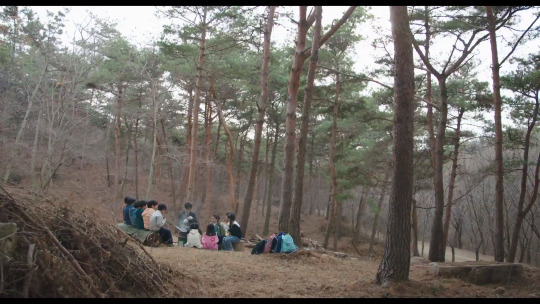#just thematic puzzle pieces slotting together wonderfully
Text
Extraordinary Attorney Woo 9
Okay, so this episode is slyly brilliant and I want to talk about it.
Episodes 7-8 were about Young-woo dealing with her parents and her connections, and Min-woo being an obnoxious pillock. In episode 9, we suddenly pivot to a story about a somewhat quaint man who kidnaps a bus of children to play games in the woods. He calls them the “Children’s Liberation Army”. He legally changed his name to a poop joke because it made kids laugh. The kids he kidnaps are a bunch of academy students who only know school and sleep. We all know this message - Korea’s academic system is broken and the casualties are the children, whose parents cannot see the hurt they inflict because they are unshakingly convinced that it is for their good (very very relatable). I root for Bang Gu-ppong because I also believe in children’s liberation, and I want him to behave so Young-woo can get him a lighter sentence, even if that means declaring him mentally unwell.
Young-woo, like me, believes in children’s liberation. Unlike me, she goes above and beyond to understand Bang Gu-ppong as an individual whose ideology has merit that should be recognised in the court - even if it means that he can’t get a lighter sentence. Her actions might not “win” the case, but she upholds her integrity towards her client and her own beliefs (a far cry from episode 5, where she ignored her gut feeling and sense of justice to win a case for a lying client). Where I am in the episode (I was so excited by its writing that I hopped on here to post meta while my brain was still firing), Min-woo has just asked Attorney Jung to please, pretty please, penalise Young-woo for her behaviour in court. Watching the scene play out, I was thinking, ‘does this man think he’s in school? you don’t just “penalise” people like that in a professional workplace, wtf...oh. OH’.
And then Attorney Jung says, “Giving rewards and punishments over who’s right and who’s wrong is not how I work”. And the whole thing just clicked.

I remember reading somewhere that children, like women, are oppressed by the patriarchy, and by the systems created and upheld by the patriarchy. The education system is one such system and is therefore punishes any behaviour that might destabilise it. “Play” - to have reckless, aimless fun for the sake of fun - is violently opposed to the patriarchy, which is “work” (boys especially are raised to place their worth in their ability to work, which is part of how the patriarchy perpetuates itself. Bang Gu-ppong is unemployed - he’s got little worth as a man, and little worth to the system).
This is the same patriarchy that Min-woo represents in this story, and that he’s been desperately trying to uphold since Young-woo, a disabled woman, barged in to completely disrupt order. When Attorney Jung asks Min-woo why he simply can’t talk things out with her, it’s because Min-woo, like a lot of people in the story including Young-woo’s father, sees her as a child. He doesn’t see her as his equal. And when she proves herself repeatedly in ways that upset his own perceptions of the world, he mentally defaults to “school”, to “penalties and rewards”, because this is the only environment he can imagine Young-woo in and this is the only environment that would certainly punish her for her disability (and we know that’s true, since she was bullied all through school). What he doesn’t realise is how much of a fool he looks by doing all that, since Young-woo sees herself as an adult (which she is, duh) and doesn’t stoop to his level of clownery. Maturity is something much deeper than parroting the “right” language and presenting yourself in the “right” way. Bang Gu-ppong seems immature, but he refuses to lie about who he is and what he’s done, and why he did it. That, for me, is “adult”.
That’s not to say that I agree with him kidnapping a bus of kids lol. He says they consented to being spirited away, to which I say, ‘meh’. When it comes to kids and consent, that is always a hairy discussion because kids genuinely don’t have the perspective to know what is good for them. But, work and study is always assumed to be good for kids without question, whilst it’s play that has to be constantly treated with suspicion, always moderated, always surveilled. And discussions around kids and consent lacks a ton of nuance - it’s almost always an either/or scenario. Either kids don’t know anything, so let’s micromanage the life out of them - or, kids can definitely consent, all the time, so their “yes” is always “yes” even when it’s said in ignorance. There has to be a better way to give kids some agency in their lives. I think the saddest thing in this episode is the implicit child abuse - if Mujin Academy is famously harsh on its students, then imagine what kind of treatment the director must have inflicted on her own kids (and having Gu-ppong’s mother be the director ties the whole thing together perfectly). But even the director herself, like all women, is only trying to navigate the patriarchy - a single mother, in a system that loathes single mothers, who goes above and beyond to mould her sons into the perfect future patriarchs. They excel in education and gain the high societal marker by making it to the best universities in the country. And she capitalises on this “success”, showing other mothers how they too can make their own potential patriarchs. In doing this, she proves her worth to the system.
After Gu-ppong tells the attorney of the playground games he had with the kids in the woods, Min-woo (who can never do anything right lol) says, “I guess you didn’t do anything incredibly original.” To which Gu-ppong responds, “The thought that playing has to be original is what creates gimmicky children’s camp field trips without the field part. Taking the children from here to there, making them do this and that, so that they can experience something novel and educational. That’s not playing. Even if all they’re doing is looking up at the sky and snickering at the clouds floating by, as long as the child is smiling and is happy in that moment, that’s what playing really is.” When he said that, the scales fell out of my eyes. It was like, of course, of course. All those school trips and summer camps I did as a kid that were heavily monitored, expensive, stressful - even the kind of play that we think is acceptable for kids, is still work. That makes sense. This was the moment I realised that this show is being written by someone who truly cares about children. And it’s so radical! It dropped something so novel (to me, at least) on the sly, and with such humility too.
Man, I love this show.

#extraordinary attorney woo#word vomit meta#but srsly when gu-ppong said that that i was like ohhh#wow the writer really cares!#this episode was full of ohhh moments#just thematic puzzle pieces slotting together wonderfully#koo kyo hwan#park eun bin#joo jong hyuk#kdrama
70 notes
·
View notes